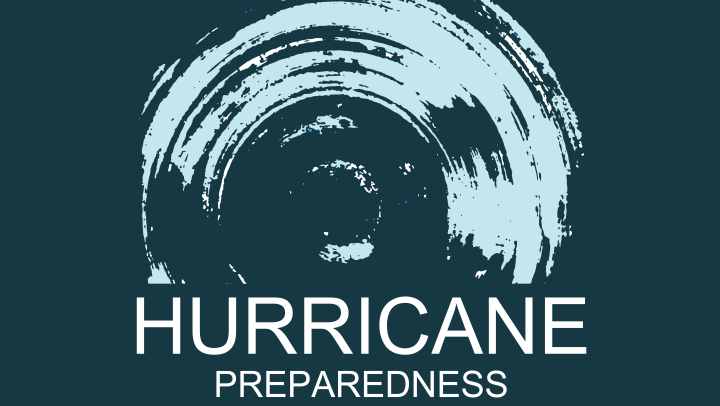Know Your Risk
Hurricanes are dangerous and can cause significant damage from storm surges, wind damage, rip currents, and flooding. They can happen along any U.S. coast or in any territory in the Atlantic or Pacific oceans. Storm surge historically is the leading cause of hurricane-related deaths in the United States. Hurricanes are not just a coastal problem, as rain, wind, water, and even tornadoes could happen far inland from where a hurricane or tropical storm makes landfall.
When is Hurricane Season?
-
Eastern Pacific Hurricane Season is typically May 15-November 30
-
Atlantic Hurricane Season generally is June 1-November 30
-
Central Pacific Hurricane Season is typically June 1-November 30
Hurricane Categories:
The 1-5 scale estimates potential property damage. A Category 3 or higher is considered a major hurricane.
Make an Emergency Plan
Make sure everyone in your household knows and understands your hurricane plans. Include the office, kids’ daycare, and anywhere you frequent in your hurricane plans. Ensure your business has a continuity plan to continue operating when disaster strikes. Click here to learn how you and your family can make your emergency plan.
Know Your Evacuation Zone
If you live in an evacuation zone, you may have to evacuate quickly due to a hurricane. Learn your evacuation routes, practice with your household and pets, and identify where you will stay. Follow the instructions from local emergency managers, who work closely with state, local, tribal, and territorial agencies and partners. They will provide the latest recommendations based on the threat to your community and appropriate safety measures.
Assemble Disaster Supplies
After an emergency, you may need to survive for several days. Being prepared means having your food, water, and other supplies last several days. A disaster supplies kit is a collection of essential items your household may need in an emergency. Ensure your emergency kit is stocked with the items on the checklist. Download a printable version to take with you to the store. Once you look at the essential items, consider your family's unique needs, such as supplies for pets, babies, or seniors.
Since you do not know where you will be when an emergency occurs, prepare supplies for home, work, and cars.
-
Home: Keep this kit in a designated place and have it ready if you have to leave your house quickly. Make sure all family members know where the kit is kept.
-
Work: Be prepared to shelter at work for at least 24 hours. Your work kit should include food, water, and other necessities like medicines and comfortable walking shoes stored in a “grab and go” case.
-
Car: If you are stranded, keep a kit of emergency supplies in your vehicle.
Recognize Warnings and Alerts
Receiving timely information about weather conditions or other emergencies can make all the difference in knowing when to act to be safe—download apps for disaster resources, weather alerts, and safety tips.
Hurricane Watch
A hurricane watch means hurricane conditions (sustained winds of 74 mph or higher) are possible within the specified area. A hurricane watch is issued 48 hours before an area's anticipated onset of tropical-storm-force winds.
During a hurricane watch, prepare your home and review your plan for evacuation in case a hurricane or tropical storm warning is issued. Listen closely to instructions from local officials.
Hurricane Warning
Hurricane warnings indicate hurricane conditions (sustained winds of 74 mph or higher) are expected within the specified area. Because hurricane preparedness activities become difficult once winds reach tropical storm force (sustained winds of 39 to 73 mph), the hurricane warning is issued 36 hours before the anticipated onset of tropical-storm-force winds to allow for necessary preparation.
During a hurricane warning, complete storm preparations and immediately leave the threatened area if directed by local officials.
When a Hurricane Warning is Announced
-
Listen to the National and City Warning System on the radio. Make plans to relocate outside of the affected area. Have current information on the location of the Red Cross shelters and directions to get there. If there are ill or disabled persons in your home, contact their doctor for instructions. If the State or Federal Warning Systems require relocation, evacuate early to avoid traffic jams and dangerous winds. Be sure to take necessities such as prescriptions, bedding, enough food for at least 24 hours, flashlights, a cell phone, and a battery-powered radio.
-
Please notify the district office if you plan to evacuate and leave the area. Provide an emergency point of contact and updated phone numbers where we can reach you.
-
If a warning is issued, remove all objects from the exterior of your home, and store these items inside your home, shed, or garage, such as patio furniture, trash cans, grills, potted plants, wind chimes, bicycles, etc. Please be advised that the management team may remove unsecured items and may find it necessary to enter your home or garage to prevent damage to your and your neighbors’ residences.
-
Close all blinds to avoid shattering glass. Do not tape any windows, as this has been deemed a dangerous and unnecessary practice. The management team will not be boarding any windows throughout the community.
-
Fill the bathtub with water. You can use this water to fill the toilet tank to induce flushing. It may also be needed for drinking if the water supply becomes interrupted or contaminated.
-
Fill all vehicles with gas. In the event of a loss of electricity, the gas pumps will not operate.
-
Carry all important paperwork and personal identification with you.
-
The management team will remove all pool furniture from the pool deck areas and secure all common areas.
-
Unplug all unnecessary items not in use. Do not unplug your refrigerator.
-
Fill containers with water and place them in the freezer. The ice will help prolong items from thawing out in case of power loss.
During the Hurricane
-
Listen to the National Warning System on the radio and follow directions thoroughly.
-
Stay indoors! If the calm eye of the hurricane passes through the area, continue to stay indoors unless it is necessary to leave.
-
If the electricity goes off, use flashlights instead of candles or kerosene lamps.
-
Use the telephone for emergencies only. Jammed phone lines may obstruct emergency calls for police, fire departments, doctors, and the Red Cross disaster units.
-
Conserve refrigeration. Open the refrigerator/freezer door as little as possible.
-
Remain indoors until the official “all clear” is given by the county Warning System on the radio.
After the Hurricane
-
Beware of outdoor hazards. Watch out for loose or dangling power lines, and report them immediately to Liberty At Your Service at 1-888-578-4141 or a Liberty representative.
-
Walk or drive cautiously. Debris-filled streets are hazardous. Washouts may weaken roads and bridge structures that could collapse under vehicle weight.
-
Open the refrigerator only when necessary. Food will spoil in the fridge if the power is off for over a few hours. Freezers will keep food for several days if the doors are not opened frequently after a power failure, but do not refreeze food once it begins to thaw.
-
Only use tap water once authorities have issued a safe water area. Use the emergency supply in the tub or boil water. Report broken sewer or water mains to Liberty At Your Service at 1-888-578-4141.
-
Do not bring gas or charcoal grills inside to use for cooking.
-
Please be patient and be prepared to be on your own for up to four days. It takes a team effort to clean up after a storm. Responsibility for the cleanup falls to numerous local, state, and federal agencies. Your property staff will make every effort to assist these agencies and our residents. Should damage to the property occur, management will make a home-by-home inspection to assess the damages. Management will create a schedule to complete the necessary repairs.
Returning Home After a Hurricane
-
Pay attention to local officials for information and special instructions.
-
Be careful during clean-up. Wear protective clothing, and use appropriate face coverings or masks if cleaning mold or other debris. People with asthma and other lung conditions and immunosuppression should not enter buildings with indoor water leaks or mold growth that can be seen or smelled, even if these individuals are not allergic to mold. Children should not help with disaster cleanup work.
-
Wear protective clothing and work with someone else.
-
Do not touch electrical equipment if it is wet or standing in water. If it is safe, turn off the electricity at the main breaker or fuse box to prevent electric shock.
-
Do not wade in flood water, which can contain dangerous pathogens that cause illnesses. This water also can contain debris, chemicals, waste, and wildlife. Underground or downed power lines also can electrically charge the water.
-
Save phone calls for emergencies. Phone systems often are down or busy after a disaster. Use text messages or social media to communicate with family and friends.
-
Document any property damage with photographs. Contact your insurance company for assistance.
Check on Your Neighbors
-
Check-in with neighbors to see how you can help each other before and after a storm.
-
If you run to the store to grab some last-minute supplies before a storm, check to see if your neighbor needs anything.
-
Get to know your neighbors before a storm or an emergency to help out in your community.
-
Help your community/neighbors get prepared & trained for an emergency by visiting: www.ready.gov/volunteer
More Hurricane Preparedness Tips
-
As part of your family’s emergency kit, include games & toys to keep children entertained.
-
Include a hand-crank or battery-powered radio in your emergency kit.
-
ATMs & credit card machines may not work during an extended power outage. Include extra cash $$ in your emergency kit.
-
Store supplies at the places you frequent most, like work and home, in case you need shelter during a hurricane.
-
Remember to include your pets in your family's emergency plans. Here is a video on how you can get your pets ready for Emergencies: https://youtu.be/BosQtZFv6Jk
-
Don’t forget to put your name and contact information on your pet’s ID tag in case you’re separated in an emergency.
-
Set up group text lists so you can simultaneously communicate with friends and family during emergencies.
-
Get the kids involved in hurricane preparedness planning with Ready Kids.
Please take the time to be prepared as possible and to be on your own for a couple of days until Federal, State, and Local officials get help into the area.


